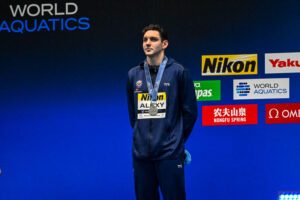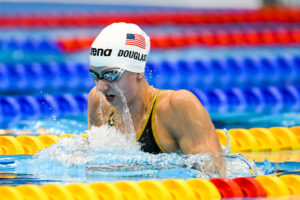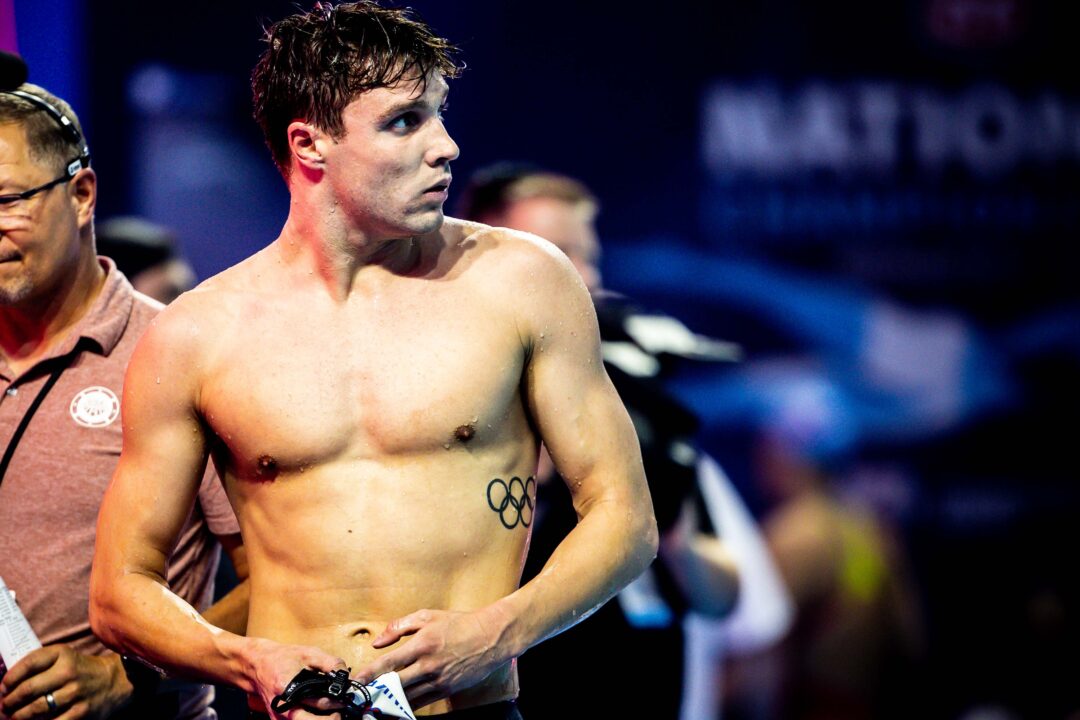Now that Worlds has ended, the dust has settled, and all the Cate Campbell-induced fighting has cooled down (to an extent), let’s talk about Team USA.
For American swim fans, this year’s World Championships felt bittersweet. On the one hand, the meet was a big step forward for the sport. There was fast swimming and competitive racing across almost every single event, records were falling left and right, and the depth was unprecedented. On the other hand, the Americans did not have the best showing. Their 7 gold medals were their lowest gold medal total at a Worlds or Olympics since 1994, American swimmers added significantly from Nationals, and there were several misfires on relays.
USA Swimming’s Gold Medal Count At Worlds/Olympics Since 1994:
- 2023 Worlds: 7
- 2022 Worlds: 17
- 2021 Olympics: 11
- 2019 Worlds: 14
- 2017 Worlds: 18
- 2016 Olympics: 16
- 2015 Worlds: 8
- 2013 Worlds: 13
- 2012 Olympics: 16
- 2011 Worlds: 16
- 2009 Worlds: 10
- 2008 Olympics: 12
- 2007 Worlds: 20
- 2005 Worlds: 15
- 2004 Olympics: 12
- 2003 Worlds: 11
- 2001 Worlds: 9
- 2000 Olympics: 14
- 1998 Worlds: 14
- 1996 Olympics: 13
- 1994 Worlds: 4
Yes, Team USA came away with the most total medals. But as SwimSwam editor-in-chief Braden Keith said in the SwimSwam Slack group chat, it felt like the Americans were just picking up the scraps, and they weren’t leading the charge on anything. They have swimmers that can reliably win silver and bronze, but the majority of the shining, Wheaties box-worthy superstars all come from other nations. In an American swimming landscape that has long relied on marketing one or two superstars like Michael Phelps or Caeleb Dressel as the face of a global sport, you can see how that *might* spark some panic, especially in a pre-Olympic year.
Out of all Team USA’s individual golds at these Worlds, Katie Ledecky‘s were the only ones that didn’t have an asterisk next to it—Kate Douglass‘s 200 IM victory was tainted by Kaylee McKeown‘s DQ and Summer McIntosh‘s withdrawal, while Kliment Kolesnikov blew Ryan Murphy and Hunter Armstrong‘s backstroke times out of the water while racing at the parallel Russian Championships with his country barred from the meet.
But the purpose of this article isn’t to sulk about how the sky is falling, because for once, the United States isn’t the top-performing swimming nation in the world. Instead, we are going to discuss what these World Championships mean for Team USA headed into the big meet down the road next summer.
So, What About Paris?
If you look deeper at the landscape of swimming, you would have seen what was coming for Team USA almost two years in advance, back when the Tokyo Olympics happened. The only golds earned by the American women were Ledecky’s obligatory distance titles and a surprise victory by Lydia Jacoby where Tatjana Schoenmaker’s semi-finals time was faster. The men’s results were largely uplifted by Team USA’s “knight in shining armor” Dressel, while Chase Kalisz and Bobby Finke won golds in weakened but wide-open fields. Team USA’s Tokyo showing was already considered slightly disappointing, but a dominant 2022 World Champs showing where the rest of the world wasn’t at full strength made us forget about it all.
So essentially what happened at the 2023 Worlds was Team USA’s Tokyo concerns coming back to bite them, but this time it was even worse without Dressel around. And the consistent adding time, which can likely be attributed to the shorter-than-usual turnaround between Nationals and Worlds, just made things uglier.
Now that all is said and done, what’s next for Team USA down the road, and how do they pick themselves back up? The answer is three words: capitalizing on opportunities.
I’m going to start off by saying that the American men and American women are in very different positions right now. Headed into the World Championships, it felt like the men were in the worst place that they had been in years, being very inexperienced without a star like Dressel to guide them. Meanwhile, I had called the women “Avengers on water”, which clearly did not age well. But the key to both teams’ success is, like I said before, to take advantage of all of the opportunities and potential that they have.
The American Men

Jack Alexy by Fabio Cetti
The men’s side at these World Championships looked more promising than the women’s side. There was a blossom of young, rookie talent that handled their first time on the big stage in a very composed manner, still managing to drop time three weeks after competing at a meet where their sole intent was to simply make the Worlds team. Names like Jack Alexy, Luke Hobson, Dare Rose, Matt King, and Thomas Heilman aren’t exactly gold medal contenders right now, but if they keep their momentum going, they could become ones soon. Alexy in particular was a major standout in a competitive sprint freestyle field, and I can envision him taking on a Nathan Adrian-like role for Team USA in the coming years. Meanwhile, the individual gold medal window for veterans like Ryan Murphy and Nic Fink might be closing, but they continue to be reliable leaders and relay pieces who are two of the biggest reasons why the American men are still favored to win the medley relay next year.
There are also plenty of multi-event stars amongst the American men that are strong in multiple events but are unlucky and happen to compete in strong international fields as well. Carson Foster and Shaine Casas are both in a Laszlo Cseh-type position with the dominance of Leon Marchand and Kristof Milak plaguing their best events. Finke is racing in a golden era of men’s distance swimming—he could very well get under the 1500 free world record and still take second. Hunter Armstrong is still relatively young and can improve in the 100 back, but so can Thomas Ceccon. An on-form Caeleb Dressel is honestly in this position as well—the rise of Kyle Chalmers, David Popovici, Milak, and Cameron McEvoy will make it difficult for him to have a guaranteed gold in Paris.
What the American men need to do to get better is further develop their rookies, because those are the guys with the highest ceiling. The rest will come down to the actual racing—whether Finke will gain that 0.05-second advantage on Ahmed Hafnaoui, whether Dressel can find his winning touch again, or whether the American backstrokers will out-touch Ceccon or Kolesnikov (if he’s back) is something that we can’t predict right now.
Oh, and the American men really need to figure out their relay leadoff situation. In the 4×100 free relay, Ryan Held was over half a second season-best leading off (if he matched his season-best, the Americans would have been 0.12 seconds within gold instead of 0.65 seconds). A similar situation happened in the 4×200, where Hobson was over a second off his individual time from the semi-finals—had he replicated his individual time, the Americans would have won gold by 0.19 instead of losing to Great Britain by nearly a second. If all their pieces come together, there is a *possible* scenario where the U.S. men sweep the relays in Paris.
The American Women
The American women felt a little flatter at Worlds, with many of their top swimmers severely underperforming after giving it all at Nationals. And unlike the men’s side, there are a lot of events that feel unreachable for any American woman, with the 50/100 free/200 free/400 free, 400 IM and the 4×100/200 free relays being just a few examples.
But just like the men, the path to gold for the women’s team is swimming the fastest at the right moment, which is something they struggled to do at Worlds. Regan Smith took two silvers and a bronze in her Olympic events at Worlds—two of those medals would have been gold if she went her season-best. Lilly King was off the podium in the 100/200 breast, but she could challenge Ruta Meilutyte and Tatjana Schoenmaker with her season-bests. Torri Huske‘s 100 fly time from last year would have won gold at this year’s Worlds, but she was nearly a second slower than that time. Just from that paragraph, I listed gold medals in five different events that could belong to American women if they were at their best, but they weren’t.

Kate Douglass by Fabio Cetti
There was some promise amongst the women though, with Kate Douglass being an example. Even when most of her teammates were struggling, she managed to step up and be at her best every time, even when she had to handle the biggest responsibility of any American woman on three weeks’ notice and take on doubles that not many others would attempt. Her 51.7 100 free split may have been overshadowed by the relay performances of Shayna Jack, but it’s the fastest split we’ve ever seen from an American—if she can replicate that relay speed in Paris, she will be lethal. She’s about to enter the most important training year of her career, being out of the NCAA and training long course full-time for the first time ever. But if it goes well, she could be one of the stars of next year’s Games.
Other names like Gretchen Walsh, Bella Sims, Claire Weinstein, Jillian Cox, and others might not be in contention for gold next year, but they are big talents who will continue to get better if they use this World Championships as a learning experience. The purpose of this next year is for swimmers to regroup and improve, which could mean different things for different swimmers. For Claire Curzan, it’s getting off to a fresh start in a new training environment. For Smith, it’s mastering taper alongside Bob Bowman. For Huske, it’s using that Olympic redshirt year to find her long-course spark again and improve on relays. I could go on and on listing certain swimmers right now, but you get my point.
My point is that even though they struggled this year, the American women still are a very, very strong team on paper. They won’t beat the Aussies in the sprint freestyle events—developing the depth that they have in the 100/200 free won’t happen in a year. In addition, there’s also a few events where it will just come down to racing, like Smith’s battles with Kaylee McKeown. But otherwise, they still have the potential to win Paris gold in several other events, as long as they perform to their full potential.
Thank goodness for Katie Ledecky though—you can always count on her to dominate and take home golds in the distance events.
Conclusion
Team USA might not be blossoming with superstars right now, but when I look at them, I see a team full of potential—and that potential wasn’t fully shown at these World Championships. But between young swimmers who had major long course breakthroughs this year (Alexy, Rose, Douglass, Finke, Heilman, etc.), seasoned veterans who consistently step up and perform at their best (Fink, Murphy, Ledecky), and swimmers who didn’t have the best year to their standards but could rebound big time next year (Huske, G. Walsh, King, R. Smith, Held), this is a team that could have an incredible Paris showing if they get it together.
And even amidst all the negativity about this year’s Worlds, Team USA has still come a long way since Tokyo in some aspects. Imagine saying in 2021 that the American women’s 4×100 free relay had three 52-point splits and there was a woman not-named Simone Manuel splitting 51-point, an American man was going 7:38/14:31 in the distance events, or that there were at least six active American men going 47-point in the 100 free. A lot of what has happened this Olympic cycle is not because of Team USA regressing, but because the rest of the world is getting stronger.
That brings me to my next and final point. There’s a possibility that the Americans have a very strong Olympics, and Ledecky will still be responsible for Team USA’s only swimming gold medals. It’s a worst-case scenario that I don’t think will happen if Team USA makes the most of what they have, but it’s still possible with how strong the rest of the world has become. And that’s okay—more parity is good for the growth of a sport. After all, at the end of the day, fast swimming is fast swimming regardless of national affiliation.
But ultimately, if Team USA puts their best forward, I think they’ll be just fine. And if they don’t, at least they still have Ledecky.

Gotta love ” what if” articles! I would love to see a stat of PBs at an Olympic games in Finals. So we know very few athletes will be at their BEST.
Smith has the ability to win, but she spins her first 50 under pressure. KING? I don’t know how hungry she is anymore. Finke is hungry! Ledecky just grinds it out. Heilman may just surprise everyone. He certainly has the mental and physical game. What surprised me about this worlds were the remarkable 15 meter finishes of the Aussies, and our not so remarkable finishes..we have a lot to improve..and we have about 10 months till trials.
Great article.
So what you’re saying is that swimmers trained at the University of Florida are the most dependable US bets for medals with also the best chances for gold. 🐊🐊🐊
Not sure the “shoulda/coulda/woulda” narrative is helpful. Sure, Regan Smith could have won the 2fly if she swam a season best…but the reality is she didn’t. Ditto comments on Torri Huske’s performance. Since there are no “do overs”, wouldn’t it be better to concentrate on what needs to change for next time? The pressure on these athletes must be overwhelming at times, it’s no wonder that superstars like Phelps, Dresser, Schmitt and Franklin have all struggled with coping with the pressure and depression? All of the athletes you mention who “should have” won, are amazing athletes and people. Let’s stop lamenting “what could have been” and celebrating “what was.”
If one prediction seems inevitable, USA Swimming will continue to see the changing of the guard in the W 4 x 200 FR-R (heats/final). It is most likely that a female swimmer between the ages of 16 and 19 will replace Leah Smith as the sixth swimmer on the W 4 x 200 FR-R. A lead-off split of 1:57.78 in the heats of the W 4 x 200 FR-R at the 2023 World Aquatics Championships no longer cuts it. The candidates are too numerous to list.
USA Swimming
W 4 x 200 FR-R “bolts from the blue”
2021 – Sims (16)
2022 – Weinstein (15)
2023 – Shackell (16)
2024 – ????????
It was anticipated… Read more »
On the men’s side, should plan “A” falter, plan “B” needs to be in place especially for the men’s 4 x 100 meter relays:
If Dressel – 100 FR/100 FL
Then Andrew – 100 BR/100 FL
Else Casas – 100 FL
USA Swimming will need all hands on deck for the 2024 Summer Olympics.
Somewhat off-topic:
Has USA Swimming officially selected the squad for the Pan American Games? If not, when is the deadline?
Of course not. They never do anything on time.
As long as they sing the National Anthem unlike the USWNST, I’m ok with whatever the swimming outcome is.
Yeah, but what if they rap it?
First, in order to sing the national anthem, they need to win. So it does matter what the outcome is.
Second, athletes are under no obligation to SING the anthem. Some don’t know the words. I’m that case, it’s best they don’t sing. However, in representing the US, I think it would be nice at the very least for them to stand respectfully with their hands over their hearts — the proper civilian salute. But singing — I don’t care. They’re not in the choir.